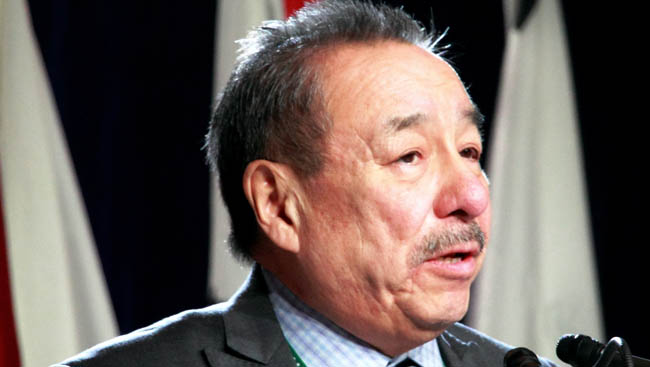Ontario Regional Chief calls on Canadians to implement TRC recommendations
June 2, 2015

TORONTO, ON (June 2, 2015) — Ontario Regional Chief Stan Beardy upholds the work of the Truth and Reconciliation Commission of Canada (TRC) and its recommendations and says the work confirms the need for a fundamental restructuring of the relationship between Indigenous and non-Indigenous Nations in order to continue.
“Recognizing and respecting sovereignty of Indigenous Nations is the foundation for reconciliation, and all Canadians and levels of Canadian governments must do their part,” said Ontario Regional Chief Beardy. “Reconciliation can only begin when Canada recognizes its current and historical disregard for Indigenous sovereignty, and when all Canadians call on the Federal Government move to work with us to restore a relationship based on mutual respect and recognition of our sovereignty.”
“The United Nations Declaration on the Rights of Indigenous Peoples (UNDRIP) should be used as the minimum standard in building a new relationship between non-Indigenous and Indigenous Nations,” said Ontario Regional Chief Beardy.
The Truth and Reconciliation Commission of Canada is holding its closing events in Ottawa this week. The Commission led by Justice Murray Sinclaircompleted six years of hearings and research and publicly released its report recommendations in Ottawa Tuesday. The TRC’s report provides a detailed account of how 150,000 Indigenous children were stripped from their families starting in the 1880s and sent to church-run schools established by the federal government. The last residential school closed in 1996. More than 7,000 former students from across the country have testified, either publicly or in private, to the commission.
“Thousands of survivors showed exemplary leadership and courage in coming forward with their stories. And with this truth, it is our responsibility as Indigenous leadership to carry these stories with us as we work to reconcile the relationship between the Crown and Indigenous Nations,” said Ontario Regional Chief Beardy. “This responsibility extends beyond leadership, and perhaps most importantly rests with all Canadian citizens who have a have a role in keeping federal and provincial leadership accountable in the process of reconciliation, and ensuring these governments hold up to their commitments.”
The TRC was established in 2008 as a part of the Indian Residential School Settlement Agreement in order to inform Canadians about the history and legacy of such schools. It wasn’t a federal government initiative. The Indian Residential School Survivors Society successfully sued the government of Canada and the churches that operated its schools. It took six years, and remains the largest class-action lawsuit in Canadian history. It was the former students themselves who insisted on a truth commission.
“As part of this acknowledgement on the long path to reconciliation, a national day of remembrance for residential school survivors should be established. Not only will it cement it into national consciousness but it will be constant reminder for future generations,” said Ontario Regional Chief Beardy.
Canada’s executive, legislative, and judicial branches each have a distinct role to play in advancing the reconciliation mandate. Ontario Regional Chief Beardy expressed hope that Canada will move forward in good faith by recognizing its historical treatment of First Nations as unacceptable. Last week, Chief Justice Beverly McLachlin recognized Canada’s actions as “cultural genocide.”
“Statements like those from Chief Justice Beverly McLachlin give me hope that Canada is ready to recognize its shameful past and move forward towards a better future,” said Ontario Regional Chief Beardy. “Never has a Supreme Court of Canada Chief Justice taken such a strong position in describing the actions of the Canadian government.Now, it is time for all levels of Government and all citizens to steer us to a new course based on our international Treaties and peaceful coexistence as sovereign nations.”
The Chiefs of Ontario will analyze the 94 recommendations put forth by the TRC today and develop an action plan to oversee their implementation.
The Chiefs of Ontario is a political forum and a secretariat for collective decision making, action, and advocacy for the 133 First Nation communities located within the boundaries of the province of Ontario, Canada. Follow Chiefs of Ontario on Facebook or Twitter @ChiefsOfOntario.
For more information, please contact:
Jamie Monastyrski, Communications Phone: 807-630-7087 – Email: jamie.monastyrski@coo.org


